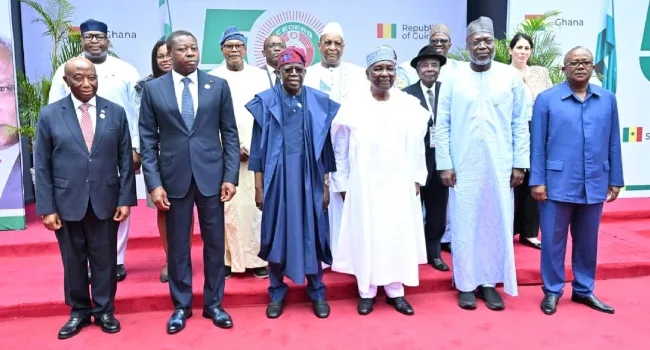Delegates from member states of the Economic Community of West African States (ECOWAS) are arriving at the Banquet Hall of the State House, Abuja, for the 67th Ordinary Session of the Authority of Heads of State and Government.
This meeting comes six months after the last session in December 2024, during which the bloc ratified the withdrawal of Mali, Burkina Faso, and Niger from ECOWAS. It also marks the end of President Bola Tinubu’s second term as Chairman of the ECOWAS Authority.
President Tinubu was first elected Chairman on July 9, 2023, and re-elected for a second term on July 7, 2024.
‘End pit-to-port dependency’
Speaking at the inaugural West Africa Economic Summit (WAES) on Saturday, held at the Bola Ahmed Tinubu International Conference Centre in Abuja, President Tinubu urged West African nations to move away from the longstanding practice of exporting raw minerals without local value addition — a trend he referred to as “pit-to-port dependency.”
He called for bold investment in regional value chains, manufacturing, and innovation, emphasizing the urgency of transforming the region’s economic model.
“The era of warm pit to the port must end. We must turn our mineral wealth into domestic economic value, jobs, technology, and manufacturing,” he said.
“To be resource-rich is not enough — we must become value-chain smart and invest in local processing and regional manufacturing.”
President Tinubu, speaking in his capacity as ECOWAS Chairman, warned that intraregional trade across West Africa remains below 10 percent — a gap he attributed not to lack of political will, but to inadequate coordination and infrastructure.
“Opportunity alone does not guarantee transformation. The global economy will not wait for West Africa to get its hands together — nor should we,” he said.
“Rather than competing in isolation or depending on external partners, we must strengthen our regional value chains, invest in infrastructure, and harmonize our policies.”
Highlighting the region’s youthful population as its greatest untapped asset, Tinubu cautioned that it could become a burden if not supported through education, digital infrastructure, and enterprise development.
“Our prosperity depends on regional supply chains, energy networks, and data frameworks. We must design them together — or they will collapse separately.”
“From the Lagos-to-Abidjan highway and the West African Power Pool to creative industry initiatives, our joint projects show what’s possible when we collaborate. But we must now move from declarations to concrete deals — from policy frameworks to practical implementation.”


